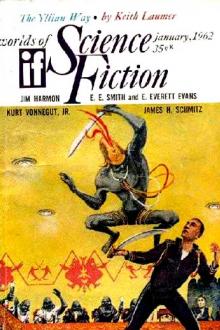Bat Wing, Sax Rohmer [top 20 books to read .txt] 📗

- Author: Sax Rohmer
Book online «Bat Wing, Sax Rohmer [top 20 books to read .txt] 📗». Author Sax Rohmer
“Val, dear,” she said, presently, addressing the girl, “you should make those sleeves shorter, my dear.”
She had a rapid way of speaking, and possessed a slightly husky but fascinatingly vibrant voice.
“Your arms are very pretty. You should not hide them.”
Val Beverley blushed, and laughed to conceal her embarrassment.
“Oh, my dear,” exclaimed Madame, “why be ashamed of arms? All women have arms, but some do well to hide them.”
“Quite right, Marie,” agreed the Colonel, his thin voice affording an odd contrast to the deeper tones of his cousin. “But it is the scraggy ones who seem to delight in displaying their angles.”
“The English, yes,” Madame admitted, “but the French, no. They are too clever, Juan.”
“Frenchwomen think too much about their looks,” said Val Beverley, quietly. “Oh, you know they do, Madame. They would rather die than be without admiration.”
Madame shrugged her shoulders.
“So would I, my dear,” she confessed, “although I cannot walk. Without admiration there is”—she snapped her fingers—“nothing. And who would notice a linnet when a bird of paradise was about, however sweet her voice? Tell me that, my dear?”
Paul Harley aroused himself and laughed heartily.
“Yet,” he said, “I think with Miss Beverley, that this love of elegance does not always make for happiness. Surely it is the cause of half the domestic tragedies in France?”
“Ah, the French love elegance,” cried Madame, shrugging, “they cannot help it. To secure what is elegant a Frenchwoman will sometimes forget her husband, yes, but never forget herself.”
“Really, Marie,” protested the Colonel, “you say most strange things!”
“Is that so, Juan?” she replied, casting one of her queer glances in his direction; “but how would you like to be surrounded by a lot of drabs, eh? That man, Mr. Knox,” she extended one white hand in the direction of Colonel Menendez, the fingers half closed, in a gesture which curiously reminded me of Sarah Bernhardt, “that man would notice if a parlourmaid came into the room with a shoe unbuttoned. Poof! if we love elegance it is because without it the men would never love us.”
Colonel Menendez bent across the table and kissed the white fingers in his courtier-like fashion.
“My sweet cousin,” he said, “I should love you in rags.”
Madame smiled and flushed like a girl, but withdrawing her hand she shrugged.
“They would have to be pretty rags!” she added.
During this little scene I detected Val Beverley looking at me in a vaguely troubled way, and it was easy to guess that she was wondering what construction I should place upon it. However:
“I am going into the town,” declared Madame de Stämer, energetically. “Half the things ordered from Hartley’s have never been sent.”
“Oh, Madame, please let me go,” cried Val Beverley.
“My dear,” pronounced Madame, “I will not let you go, but I will let you come with me if you wish.”
She rang a little bell which stood upon the tea-table beside the urn, and Pedro came out through the drawing room.
“Pedro,” she said, “is the car ready?”
The Spanish butler bowed.
“Tell Carter to bring it round. Hurry, dear,” to the girl, “if you are coming with me. I shall not be a minute.”
Thereupon she whisked her mechanical chair about, waved her hand to dismiss Pedro, and went steering through the drawing room at a great rate, with Val Beverley walking beside her.
As we resumed our seats Colonel Menendez lay back with half-closed eyes, his glance following the chair and its occupant until both were swallowed up in the shadows of the big drawing room.
“Madame de Stämer is a very remarkable woman,” said Paul Harley.
“Remarkable?” replied the Colonel. “The spirit of all the old chivalry of France is imprisoned within her, I think.”
He passed cigarettes around, of a long kind resembling cheroots and wrapped in tobacco leaf. I thought it strange that having thus emphasized Madame’s nationality he did not feel it incumbent upon him to explain the mystery of their kinship. However, he made no attempt to do so, and almost before we had lighted up, a racy little two-seater was driven around the gravel path by Carter, the chauffeur who had brought us to Cray’s Folly from London.
The man descended and began to arrange wraps and cushions, and a few moments later back came Madame again, dressed for driving. Carter was about to lift her into the car when Colonel Menendez stood up and advanced.
“Sit down, Juan, sit down!” said Madame, sharply.
A look of keen anxiety, I had almost said of pain, leapt into her eyes, and the Colonel hesitated.
“How often must I tell you,” continued the throbbing voice, “that you must not exert yourself.”
Colonel Menendez accepted the rebuke humbly, but the incident struck me as grotesque; for it was difficult to associate delicacy with such a fine specimen of well-preserved manhood as the Colonel.
However, Carter performed the duty of assisting Madame into her little car, and when for a moment he supported her upright, before placing her among the cushions, I noted that she was a tall woman, slender and elegant.
All smiles and light, sparkling conversation, she settled herself comfortably at the wheel and Val Beverley got in beside her. Madame nodded to Carter in dismissal, waved her hand to Colonel Menendez, cried “Au revoir!” and then away went the little car, swinging around the angle of the house and out of sight.
Our host stood bare-headed upon the veranda listening to the sound of the engine dying away among the trees. He seemed to be lost in reflection from which he only aroused himself when the purr of the motor became inaudible.
“And now, gentlemen,” he said, and suppressed a sigh, “we have much to talk about. This spot is cool, but is it sufficiently private? Perhaps, Mr. Harley, you would prefer to talk in the library?”
Paul Harley flicked ash from the end of his cigarette.
“Better still in your own study, Colonel Menendez,” he replied.
“What, do you suspect eavesdroppers?” asked the Colonel, his manner becoming momentarily agitated.
He looked at Harley as though he suspected the latter of possessing private information.
“We should neglect no possible precaution,” answered my friend. “That agencies





Comments (0)